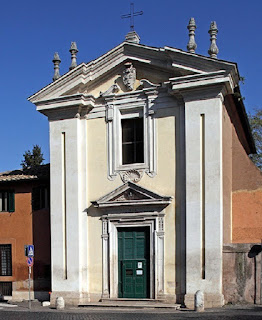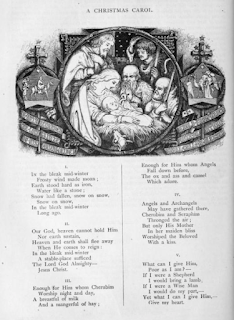In November, in the days to remember the dead, When air smells cold as death, St. Malachy, who is very old, gets up, Parts the thin curtains of trees and dawns upon our land.
So begins Thomas Merton’s haunting poem St. Malachy. The first native-born Irish saint to be formally canonized, Saint Malachy (1094-1148) was Archbishop of Saint Patrick’s primatial see of Armagh, who famously died in the arms of Saint Bernard of Clairvaux on All Souls Day and is accordingly commemorated in the Church’s calendar on November 3. Saint Bernard later wrote a life of Saint Malachy, although what Malachy may be best remembered for is the so-called Doomsday Prophecy, a 16th-century fraud, which allegedly predicted (and gave now famous mottoes for) the reigns of 112 popes prior to the Last Day, from Celestine II (« Ex castro Tiberis ») to the present. (My only actual personal connection with Saint Malachy derived from my having served as a deacon at Saint Malachy’s Church, « The Actors’ Chapel, » in New York from 1990 to 1994 and then having celebrated my Mass of Thanksgiving there after my ordination as a priest in 1995.)
Merton’s sentiments about November, however, have had a lasting resonance for me. Traditionally, November signals the beginning of the annual winter cycle. Especially with the return to « Standard Time » (something more resembling natural time than the even more artificial « Daylight Saving Time » which the summer season inflicts on us), the evenings now come ever earlier and with the dark also the increasing cold in the air. I likewise welcome my meditative mornings, sitting securely wrapped in my weighted blanket while it is still dark outside.
All these natural autumnal alterations, of course, conspire to associate this season with serious thoughts about the end – whether the end of all things on that dies irae that the world is each year closer to, or the more personal end of oneself in death that each of us is also each year closer to. « When one is seventy, one cannot be sure of the future, » the future Pope Saint John XXIII wrote while on retreat in French North Africa on Holy Saturday in 1950. At no age, but especially for me now in my mid-70s, can anyone be sure of anything when it comes to the future. If, as some scholars suggest, the future tense evolved out of the subjunctive as life became more predictable, perhaps the reverse may be true in the life not of the species but of the individual, for whom the future is increasingly subjunctive as we age!
All this was brought home to me on Saint Malachy’s feast day this year, when I received the sad news of the death of one of my novitiate classmates. We were novices together in 1981-1982 and then seminarians together in 1982-1986. He was undoubtedly the most talented and creative member of our class and perhaps the most talented and creative Paulist of that period. He was ordained a priest in 1987 and served for several years as a parish priest at the Paulist Mother Church in New York. He was a dynamic force in the parish and is still well remembered by many old-timers from that era. Years later, when I in turn was on the parish staff, he had by then sadly left the priesthood, but he still used to lead a group session at the parish center on Saturday mornings, and I remember many a Saturday stopping by to visit him before his session started. His gifts and talents were many and enriched the lives of parishioners and of many others beyond the parish, who benefited from his energy, his passion, and, above, all his kindness. May he rest in peace, and may the angels lead him to paradise!
That same Holy Saturday 1950, Saint John XXIII wrote how he comforted himself « with the thought that the souls that I have known, loved, and still love » were « in the other world, waiting and praying for me. » While (like most mortals) I am in no great rush to join them there, I too am consoled by that thought. It assuages the regret one feels – that I certainly feel – about past relationships ruptured or otherwise lost to the passage of time, friends and colleagues and even family one was once associated with on this mysterious journey through life but whom I no longer see or hear for random reasons more accidental than purposeful. I miss them, just as much as I miss my departed family, friends, fellow-workers, and former parishioners!
The impending holiday season simultaneously softens the harshness of winter’s evocation of our inevitable end with the warmth of sentimentality and nostalgia, while heightening the inevitable sense of personal and collective loss as one looks at the increasing number of empty places at the table (both literally and metaphorically) at the Thanksgiving and Christmas feasts.
Faith (that is, Christian faith) does not do away with those complex and awkward feelings, but they are taken up (aufgehoben, in the Hegelian sense) in the larger transformative narrative that the impending holiday season struggles to evoke, between Advent’s somber focus on the end and the Christmas celebration of the incarnation’s impact in the encounter of God-with-us that has replaced our estrangement.





